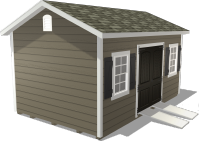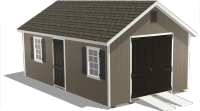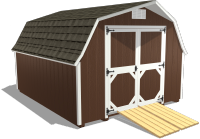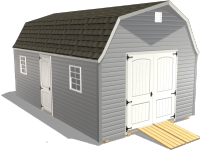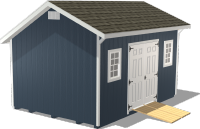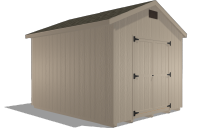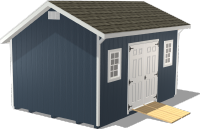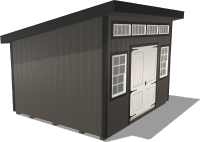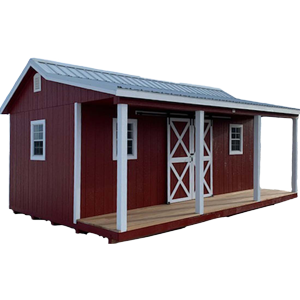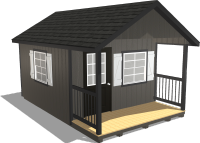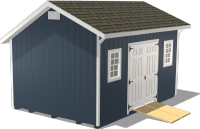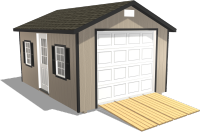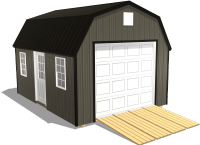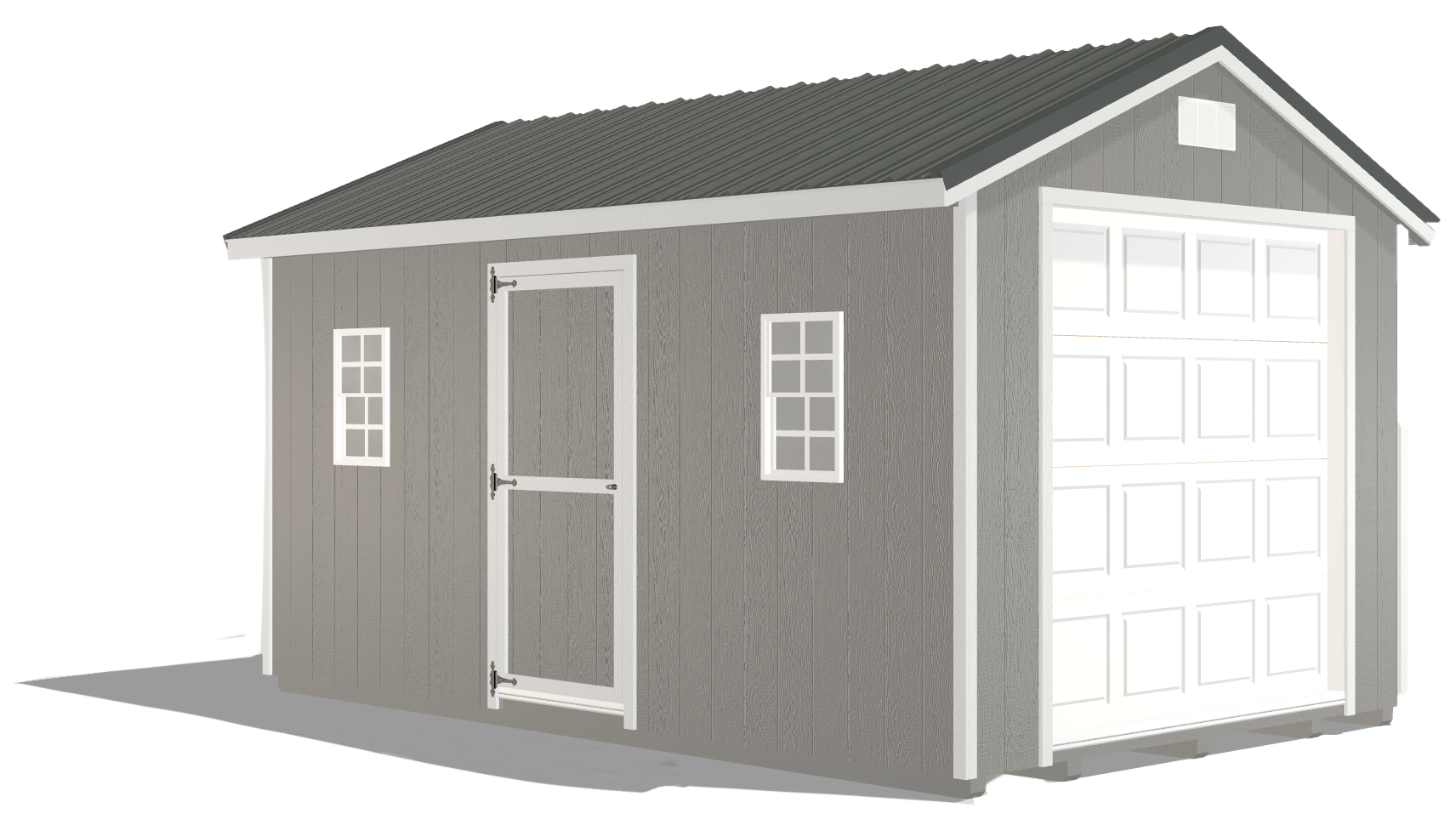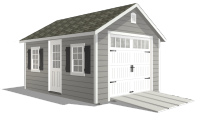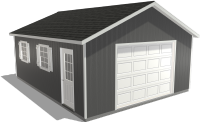Hen House Havens Unveiled: The Perfect Backyard Chicken Coop Retreat
by Dakota Storage Buildings, on August 09, 2023
.png?width=900&height=450&name=Correct%20DSB%20Blog%20Images%20(2).png)
If you plan on raising backyard chickens, you are likely excited about this new adventure but may have plenty of questions. One of the most significant questions beginners ask is, "How can I create an ideal living environment for my hens?" This question is critical, as the quality of life your hens lead directly affects their overall health, egg production, and happiness. The core of this living environment is the backyard chicken coop, a place for your chickens to roost, lay eggs, and find shelter from the elements and potential predators. But creating a hen house is not just about providing shelter; it is about crafting a haven that caters to your hens' natural behaviors, allowing them ample room to roam, and ensuring they feel comfortable and secure.
A Hen House Fit for Your Backyard
Chickens have a unique social structure, a distinctive daily routine, and specific needs that must be met to ensure their well-being. These factors affect their daily routine and the design of a perfect hen house. Chickens huddle together on the roost at night, a trait rooted in their instinct for safety and warmth. Consider the size and number of your chickens to ensure the roosting area is spacious and comfortable. However, they appreciate their space during the day to peck, scratch, and stretch their wings. The size of your hen house should be calculated based on the number of hens you plan to keep. The rule of thumb is to provide a minimum of 4 square feet per chicken inside the chicken coop and 8-10 square feet per chicken in an outside run. This ensures they have enough room to move, feed, and socialize without feeling cramped.
The flooring of backyard chicken coops should be easy to clean, resistant to decay and warping, and comfortable for your chickens. Many pre-built coops have durable yet attractive flooring that checks all these boxes. You can enhance the comfort of this flooring by covering it with bedding materials like straw or wood shavings. This provides a soft surface for your chickens, helps absorb droppings, and reduces odor. Chickens need protection from weather elements, and your chicken coop's roofing is critical in providing this protection. Most pre-built chicken coops have asphalt shingles or steel roofing, offering excellent weather resistance.
Quality Materials for Your Hen House
Choosing the right materials for your chicken coop is crucial to ensure it stands the test of time, provides a safe and comfortable home for your hens, and minimizes potential health hazards. When thinking about materials, it is easy to get overwhelmed by the array of options available. However, one primary material to consider is wood. High-quality, untreated wood is often the top choice for several reasons.
Durability: Backyard chicken coops must withstand weather elements, constant use, and the wear and tear that comes with housing animals. High-quality wood offers superior durability and longevity, making it a great choice. It can withstand the beating sun, harsh winters, and heavy rains without falling apart.
Natural Resistance to Rot: Different types of wood have varying degrees of resistance to rot, but some species have exceptional rot-resisting properties. This natural resistance is beneficial since a rotting coop can harbor harmful bacteria and fungi and risk your chickens' health.
Non-toxic: Some woods are treated with chemicals to resist pests and decay. However, these chemicals can harm your chickens if ingested or inhaled. Choosing untreated, high-quality wood avoids this risk, making it safer for your hens.
What Makes a Chicken Haven
Building a coop is the first step towards creating a haven for your hens. However, a truly idyllic chicken retreat requires more than a place to roost and lay eggs. Think of the coop as the heart of your chicken haven, but the rest of the landscape contributes to your flock's overall health and happiness.
Landscaping
Transform your backyard into a chicken paradise by introducing elements that enhance their natural behaviors. Chickens love to forage, scratch, and dust bathe. A garden bed filled with compost or a sandy spot for dust baths can provide hours of entertainment and help keep parasites at bay. Adding logs or stumps can provide extra perching places, aiding in foot health and giving your chickens a place to rest and observe their surroundings.
Plants for Chickens
Many common garden plants can benefit your chickens through direct consumption or attracting insects for them to eat. Consider planting herbs like lavender and mint, which are enjoyed by chickens and have pest-repelling properties. Leafy greens like kale and spinach provide healthy treats and keep your hens busy. Always ensure that the plants you choose are safe for chicken consumption.
Clean Water Supply
A clean and consistent water supply is essential for your chickens' health. This involves more than just a water dispenser in their coop. Consider adding a small, shallow pond or birdbath to your chicken run. Chickens do not swim, but they will enjoy drinking from a natural water source, which can also attract insects for them to eat.
Quality Coop for Easy Cleaning
Part of maintaining a chicken haven is ensuring it remains clean and hygienic. A well-constructed coop with easy access to nesting boxes and roosts will make your regular cleaning routine much easier. Features like removable trays or flooring materials that can be hosed down will make this task less daunting and more efficient.
.png?width=900&height=450&name=Correct%20DSB%20Blog%20Images%20(1).png)
Caring for Your Backyard Chickens
Caring for your backyard chickens involves understanding their dietary needs, hygiene requirements, and daily routines. A well-balanced diet is vital for the health and productivity of your hens. Backyard chickens consume about 150g of feed per hen daily, which should be balanced poultry feed. This gives them the necessary nutrients they need for healthy egg production. Alongside the feed, kitchen scraps and garden waste can provide great variety and supplemental nutrition. An average hen drinks approximately 500ml of water per day. This requirement increases during hot weather and egg production, so ensure your chickens always have access to clean water.
Maintaining a clean hen house is essential for your chickens' comfort and health. A dirty coop can be a breeding ground for parasites and disease. Regular cleaning will prevent these issues and keep your coop smelling fresh. The bedding in the coop should be replaced regularly or whenever it starts to smell. This will likely be a twice-weekly task for a larger coop housing about 10 chickens. Regularly removing droppings and turning over the bedding can help extend the time between full coop cleanouts.
Keep Your Chickens Safe and Happy
Creating a haven for your hens promotes their health, happiness, and security. With a few careful considerations, your backyard coop can become a fortress, safeguarding your flock from threats while still allowing them to exhibit their natural behaviors. The ultimate goal for any backyard chicken owner is to strike the right balance between freedom and security. Chickens are happiest when they have room to roam, scratch, forage, and dust-bathe. However, too much freedom can expose your flock to threats like predators, extreme weather conditions, and disease. A sturdy coop provides a safe place for your chickens to return to at night and a secure environment during the day when you cannot supervise their free-ranging. This involves secure locking mechanisms on all doors and windows and hardware cloth over ventilation openings.
Enhance Your Flock’s Quality of Life
Providing perfect backyard chicken coops goes beyond the physical structure of the coop. It is about creating an environment that caters to your hens' natural behaviors, health, and happiness. A hen house haven enhances the quality of life for your chickens and ultimately leads to happier hens and better egg production. To provide more in-depth information, tips, and ideas, we created a comprehensive guide to creating the perfect backyard chicken coop retreat. Start down the path to creating a haven for your hens and download our free guide, Evaluating the Best-fit Quality Chicken Coops, today!



